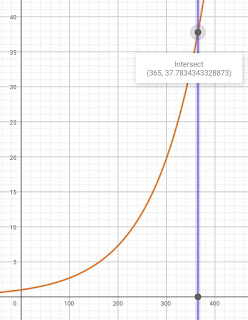Why 37.8 matters
Nothing in the world can take the place of persistence. Talent will not;
nothing is more common than unsuccessful men with talent. Genius will not;
unrewarded genius is almost a proverb. Education will not; the world is full
of educated derelicts. Persistence and determination are omnipotent.
Calvin Coolidge
We are what we repeatedly do. Excellence, then is not an act, but a habit.
Aristotle
While being so closely linked to the answer to the ultimate question alone would be reason enough to treat 37.8 with special respect, there is one more reason why this number is super important.
37.8 demonstrates the unbelievable power of compounded interest, the power of a growth mindset. By making very small but consistent efforts every day, you will achieve progress to your goals faster than you would have ever imagined.

I am starting this blog with a commitment to add a small bit of valuable content every day over the next 1 year. I am excited to test my perseverance to live up to this commitment, and to see where this experiment will take me.

Comments
Post a Comment